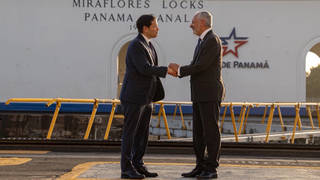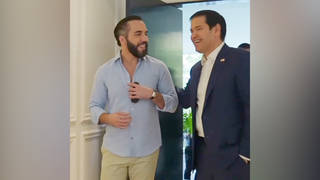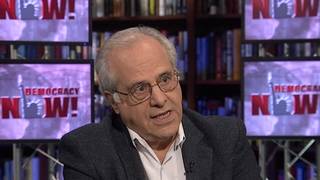
Related
Guests
- Richard Wolffemeritus professor of economics at University of Massachusetts, Amherst, and visiting professor at New School University. He hosts a weekly program on WBAI 99.5-FM called Economic Update every Saturday at 12 p.m. ET. He is the author of several books, including, most recently, Democracy at Work: A Cure for Capitalism.
The eyes of the financial world are on the small Mediterranean island of Cyprus today. The government of Cyprus has brokered a last-ditch $13 billion bailout deal with European officials to stave off the collapse of its banking sector. Under the deal, all bank deposits above approximately $130,000 will be frozen and used to help pay off the banking sector’s debts. An earlier version of the deal collapsed last week when Cypriots took to the streets to protest paying a tax of up to 10 percent on their life savings. The plan led to mass demonstrations as well as panicked bank withdrawals as Cypriots rushed to protect their savings. “It’s a demonstration of people power in this little corner of the world that’s very impressive, and the basis, I think, for some optimism about opposition,” says Richard Wolff, economics professor emeritus at University of Massachusetts, Amherst, and visiting professor at New School University. He is the author of several books including, most recently, “Democracy at Work: A Cure for Capitalism.” [includes rush transcript]
Transcript
AMY GOODMAN: The eyes of the financial world are on the small Mediterranean island of Cyprus today. The government of Cyprus has brokered a last-ditch $13 billion bailout deal with European officials to stave off the collapse of its banking sector. Under the deal, all bank deposits above approximately $130,000 will be frozen and used to help pay off the banking sector’s debts. This will result in especially heavy losses for foreign depositors at the Mediterranean island’s banks, many of which are Russian. In addition, Cyprus’s second-largest bank will be shut down.
Protesters have described the deal as an economic World War III. Some economists say Cyprus is a harbinger of things to come in Europe and possibly even the United States. Cyprus’s president described the deal as a painful one, but Eurogroup chair Jeroen Dijsselbloem praised the deal.
JEROEN DIJSSELBLOEM: The program will be based on ambitious measures in areas of fiscal consolidation, structural reforms and privatization. The authorities will also take decisive action to safeguard the stability of the financial sector, including bank resolution and deep restructuring measures concerning the two largest banks. A levy on deposits across the whole banking sector can and will therefore be avoided.
AMY GOODMAN: An earlier version of the deal collapsed last week when Cypriots took to the streets to protest paying a tax of up to 10 percent on their life savings. The package called on Cyprus to impose a one-time tax on bank deposits as a condition for $13 billion in rescue money. The plan led to mass demonstrations as well as panicked bank withdrawals as Cypriots rushed to protect their savings. On Sunday, the island’s central bank imposed a 100-euros-per-day withdrawal limit on bank accounts, which led to a fresh round of protests.
PROTESTER: If we can take 100 euros today with what the Eurogroup has decided for the Cyprus nation, we will not have nothing in the coming months and years, and that will be the same for many years. The only solution is to find a solution outside from troika and the IMF and stand on our feet on our own, because it looks like our friends in Europe are not supporting us at all.
AMY GOODMAN: Well, for more, we’re joined right now by Richard Wolff. He’s professor emeritus of economics at the University of Massachusetts, Amherst, visiting professor at New School University here in New York, and hosts a weekly program on WBAI 99.5 in New York City called Economic Update every Saturday at noon. He’s the author of a number of books, including, most recently, Democracy at Work: A Cure for Capitalism.
Richard Wolff, welcome back to Democracy Now! Why is Cyprus so significant?
RICHARD WOLFF: Well, Cyprus is significant for several reasons. First, it marks an escalation in what we call austerity economics. It is an effort to pay for the cost of this now six-year-old global crisis in a new way. It is an effort to fund the bailouts of banks in a new way. And the new way was agreed last week by the European forces that control this—the central bank, the European Union and the IMF—and to impose on Cyprus this new step, which is literally to go into the bank accounts of the citizens of Cyprus, roughly a million people on a small island in the middle of the Mediterranean, and snatch money out of their accounts. See, unlike other austerity, where you levy a tax and you cut back social programs, like we’re doing here in the United States, that money dribbles in over a year or longer period. This way, the government can get the money to bail out the banks quickly and cleanly and neatly. Friday night, the people of Cyprus went to bed with a certain amount of money in their accounts—they thought—and Monday morning, last Monday, they were supposed to awake with X percent less money because the government had taken it. So, that’s an amazing new step of austerity. It suggests that this crisis is far from over and that the authorities are desperate to find the money, other than by taxing corporations, other than by taxing the wealthy, in order to solve their problems.
The second reason it’s important—and you stressed that—is that the people of Cyprus woke up, took one look at this, and said no—and did it dramatically. And in a matter of hours, they undid everything that the European governments and their own government had agreed to a few nights earlier. So it’s a demonstration of people power in this little corner of the world that’s very impressive, and the basis, I think, for some optimism about opposition.
AMY GOODMAN: How did they say no?
RICHARD WOLFF: Basically, by saying, “We’re going to disrupt everything. We’re not going to go to work. We’re not going to consume. We’re just—we’re going to call on our fellow citizens across Europe to recognize that if they can come into our bank account and take our money, then what is exactly going happen in places like Italy, Spain, Portugal, Hungary, Britain, where very similar situations are playing themselves out?” So this call for solidarity around this issue terrified all the other governments of Europe. And suddenly, the firmly committed deal unraveled in the face of popular resentment and opposition.
AMY GOODMAN: How did Cyprus get to this point?
RICHARD WOLFF: Cyprus is a small country. Its economy is based on three things: tourism—it’s a very pleasant place for northern Europeans to go; shipping, as befits an island; but above all, what is euphemistically called “finance.” In the go-go years of the 1990s and early in this century, what the banks in Cyprus did is offer themselves around the world as a wonderful place to come and make a deposit. “We will convert whatever currency you have into euros,” which is a very good currency to have. “We will pay you an unusually high interest rate. We will ask no questions.” This is often called “good banking.” So they got a lot of deposits. To give you an idea, depending on the estimates you believe, the total deposits in the banks of Cyprus were five to eight times larger than the total GDP, the total output per year, of that economy, which is an absurd situation.
And those banks in Cyprus took all those deposits, and then they did what banks are supposed to do: find prudent, safe, non-risky investments. And like all big banks in the last 20 years, they failed. They found bad investments. They didn’t do it prudently. They misassessed the risk. And then the banks fell apart. Since that’s an outsized part of the Cyprus economy, the whole Cyprus economy, already impacted by this crisis with less tourism and less shipping, now saw its banks defunct—bankrupt, basically—and appealed to Europe to bail them out, which is the standard procedure now in Europe as these economies have such trouble.
AMY GOODMAN: Despite widespread opposition to the deal by the residents of Cyprus, Cyprus’s parliament will not need to approve today’s deal with international lenders. That’s because the parliament passed the necessary legislation to implement the bailout last week. On Friday, the governor of the Cyprus Central Bank warned political leaders that the country would face a disorderly bankruptcy unless they approved the bailout.
PANICOS DEMETRIADES: [translated] All of the elements that the Central Bank of Cyprus contributed must be voted for immediately and as they are, for two basic reasons: first, so that a very positive message is sent abroad, which will help in an agreement soon with the troika, and secondly, it is absolutely necessary that the Central Bank of Cyprus has the right legal tools to allow it to handle the crisis which the Cypriot economy is facing.
AMY GOODMAN: Richard Wolff, can you respond?
RICHARD WOLFF: Yes. This is blackmail. This is basically the officials of the banks and the political leaders going to be mass of people and saying to them, “This awful deal that makes you, who have nothing to do with the crisis and didn’t get any bailout, pay the costs of the crisis and the bailout. You must do this, because if you don’t, we will do even more damage to you and your economy. So give us your deposits, give us your money, pay more taxes, suffer fewer social programs, because if you don’t, we will impose even worse on you.” It’s the basic idea of austerity across the board and in our country, too. And I think it’s the confrontation of a system that does not work with the mass of the people, saying, “We will go down and take you with us, unless you bail us out.”
AMY GOODMAN: Explain whose money it is.
RICHARD WOLFF: It’s amazing, you know? The way this works, the plan, which is still on the board, is to go into the accounts of depositors. Remember, a depositor puts his or her money, whether they’re a business or an individual, in a bank under the notion that it’s guaranteed, it’s insured, and it’s safe. Otherwise, you wouldn’t put your money there. It takes these people’s money, thereby destroying all confidence and feelings of insurance or security, and the government will take that money, and the government will then, in the language of these politicians, “recapitalize our banks and restructure them.” Translated into simple English, they’re going to take the depositors’ money and bail out the banks. In other words, the money leaves the account of the depositor—you and me—and goes into the account of the bank itself. It is the banks, through the government, stealing from their own depositors. It is stunning, as an economist, to watch it. It’s the opposite of a bank guaranteeing your deposit. It’s a bank looting your deposit in their own bank. It’s an extraordinary study in how extreme this crisis is, that they would have to go to such an extent and risk the blowback that you already see in Cyprus and that is building in other countries as they confront similar measures.
AMY GOODMAN: And the significance of the second-largest bank being closed?
RICHARD WOLFF: That’s simply an attempt to save private banking. What they’re going to do is move much of that closed bank into the other non-closed bank and have the government absorb the losses that are not transferred, so that you can save private banking by reducing three or four large banks to one fewer by taking the one in the worst condition and basically bailing it out for its mistakes and putting what’s valuable in it into the other private banks. It’s a refusal to confront that private banking, not just in Cyprus, not just in Greece, but across the world, has driven us into a catastrophe of global proportions, and we’re doing everything in our governments to fix this situation without imposing on them, without questioning their failed performance. It’s an amazing study in how to solve a problem by refusing to confront its cause.
AMY GOODMAN: We’re talking to Professor Richard Wolff, professor emeritus, University of Massachusetts, Amherst, now at New School University in New York, has written a number of books. His latest is Democracy at Work: A Cure for Capitalism. We’ll go from Cyprus to the economy in Europe and the economy right here in the United States. And what exactly does he mean, “a cure for capitalism”? stay with us.












Media Options